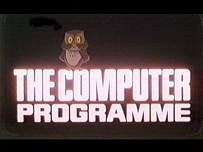The Computer Programme
The Computer Programme was a TV series, produced by Paul Kriwaczek, originally broadcast by the BBC (on BBC 2) in 1982. The idea behind the series was to introduce people to computers and show them what they were capable of. The BBC wanted to use their own computer, so the BBC Micro was developed as part of the BBC Computer Literacy Project, and was featured in this series. The series was successful enough for two series to follow it, namely Making the Most of the Micro in 1983 and Micro Live from 1984 until 1987.
| The Computer Programme | |
|---|---|
 Logo from The Computer Programme | |
| Presented by | Ian McNaught-Davis Chris Serle |
| Theme music composer | Kraftwerk |
| Opening theme | Computer World |
| Country of origin | United Kingdom |
| No. of episodes | 10 |
| Production | |
| Running time | 25 minutes (approx.) |
| Release | |
| Original network | BBC 2 |
| Picture format | PAL (4:3) |
| Original release | 11 January – 15 March 1982 |
| Chronology | |
| Followed by | Making the Most of the Micro |
Presenters
The two studio presenters were Ian McNaught-Davis (known as 'Mac') and Chris Serle,[1] the former showing the latter some of the rudimentary basics of computer operation and BASIC programming. The 'on location' reporter was Gill Nevill.
Format
Each programme would normally start with either Serle or McNaught-Davis introducing a real-life situation where computers are being (or could be) applied - examples included the office, a car factory and the British Library. This would form the theme which would underpin the demonstrations shown on the programme.
Distribution
The programme was broadcast in the United States in 1983 by PBS.[2]
In addition, stock footage from The Computer Programme was incorporated into the 2009 BBC one-off drama Micro Men, which focused on the early fortunes of British computer manufacturers Sinclair Research and Acorn Computers (manufacturers of the ZX Spectrum and BBC Micro, respectively), which both featured heavily on the show during its original run.
The show was aired as Connecta el micro, pica l'start (Connect the micro, push start) on the Catalan channel TV3. This adapted version included the original 30 minutes taken from the BBC's show plus 15 minutes with original footage. In this original footage the BBC Micro computers were substituted by Dragon 200 computers, which were made in Spain.[3]
Programmes
The series was split into 10 programmes, each about 25 minutes long and dealing with a particular subject area. They were as follows (original airdates in brackets):
- It's Happening Now - (11 January 1982)
- Just One Thing After Another - (18 January 1982)
- Talking to a Machine - (25 January 1982)
- It's On the Computer - (1 February 1982)
- The New Media - (8 February 1982)
- Moving Pictures - (15 February 1982)
- Let's Pretend - (22 February 1982)
- The Thinking Machine - (1 March 1982)
- In Control - (8 March 1982)
- Things to Come - (15 March 1982)
Theme music and opening titles
The theme music to the programme was Kraftwerk's Computer World, taken from their 1981 album of the same name. The opening titles was an animation of an owl - the mascot (and logo) of the BBC Microcomputer system - flying into a domestic living room. The "owl" theme would be used on the two successor shows. The ending was Computer World 2, taken from the same album.
References
- "25th anniversary of BBC Micro TV series". Drobe. 13 January 2007. Retrieved 23 March 2012.
- InfoWorld Media Group, Inc. (4 April 1983), PBS will air 10-part series on micros, 5, InfoWorld Media Group, Inc., p. 8, ISSN 0199-6649, retrieved 15 October 2012
- Dragon, El BBC Micro Español article in "Fase Bonus", 17 September 2011 (in Spanish)